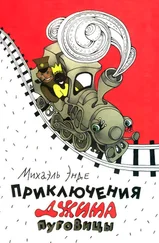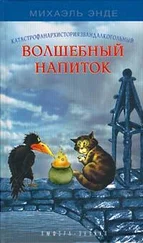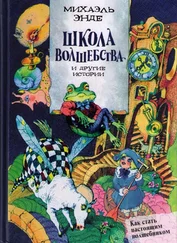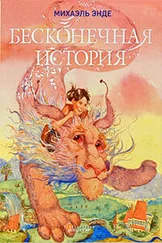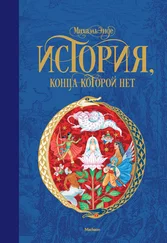“A long, long time ago,” the flowery woman began, “our Childlike Empress was deathly ill, for she needed a new name, and only a human could give her one. But humans had stopped coming to Fantastica, no one knew why. And if she had died, that would have been the end of Fantastica. Then one day—or rather one night—a human came after all. It was a little boy, and he gave the Childlike Empress the name of Moon Child. She recovered, and in token of her gratitude she promised the boy that all his wishes in her empire would come true—until he found out what he really and truly wanted. Then the little boy made a long journey from one wish to the next, and each one came true. And each fulfillment led to a new wish. There were not only good wishes but bad ones as well, but the Childlike Empress drew no distinction; in her eyes all things in her empire are equally good and important. In the end the Ivory Tower was destroyed, and she did nothing to prevent it. But with every wish fulfillment the little boy lost a part of his memory of the world he had come from. He didn’t really mind, for he had given up wanting to go back. So he kept on wishing, but by then he had spent all his memories, and without memories it’s not possible to wish. So he had almost ceased to be a human and had almost become a Fantastican. He still didn’t know what he really and truly wanted. It seemed possible that his very last memories would be used up before he found out. And if that happened, he would never be able to return to his own world. Then at last he came to the House of Change, and there he would stay until he found out what he really and truly wanted. You see, it’s called the House of Change not only because it changes itself but also because it changes anyone who lives in it. And that was very important to the little boy, because up until then he had always wanted to be someone other than he was, but he didn’t want to change.”
At this point she broke off, because her visitor had stopped chewing and was staring openmouthed.
“If that one doesn’t taste good,” she said with concern, “just put it down and take another.”
“W-what?” Bastian stammered. “Oh no, it’s delicious.”
“Then everything’s fine,” said the woman. “But I forgot to tell you the name of the little boy, who had been expected so long at the House of Change. Many in Fantastica called him simply ‘the Savior,’ others ‘the Knight of the Seven-armed Candelabrum,’ or ‘the Great Knower,’ or ‘Lord and Master.’ But his real name was Bastian Balthazar Bux.”
The woman turned to Bastian with a smile. He swallowed once or twice and said very softly: “That’s my name.”
“Well then!” said the woman, who didn’t seem the least surprised.
Suddenly the buds on her hat and dress burst into bloom.
“But,” said Bastian hesitantly. “I haven’t been in Fantastica a hundred years.”
“Oh, we’ve been waiting for you much longer than that,” said the woman. “My grandmother and my grandmother’s grandmother waited for you. You see, now someone is telling you a story that is new, even though it’s about the remotest past.”
Bastian remembered Grograman’s words. That had been at the beginning of his journey. And now suddenly it seemed to him that a hundred years had indeed elapsed since then.
“But by the way, I haven’t introduced myself. I’m Dame Eyola.”
Bastian repeated the name, several times before he was able to pronounce it properly. Then he took another fruit. He bit into it, and as usual thought the one he was eating was the most delicious of all. But then he noticed with some alarm that there was only one left.
“Do you want more?” asked Dame Eyola, who had caught his glance. When Bastian nodded, she plucked fruit from her hat and dress until the bowl was full again.
“Does the fruit grow on your hat?” Bastian asked in amazement.
“Hat? What are you talking about?” cried Dame Eyola. But then she understood and broke into a loud, hearty laugh. “So you think it’s a hat I’ve got on my head? Not at all, dear boy. It all grows out of me. Just as your hair grows out of you. That should show you how glad I am that you’ve finally come. That’s why I’m flowering and bearing fruit. If I were sad, I’d wither. But come now, don’t forget to eat.”
Bastian was embarrassed. “I don’t know,” he said. “Is it all right to eat something that comes out of somebody?”
“Why not?” asked Dame Eyola. “Babies drink milk that comes out of their mothers. There’s nothing better.”
“That’s true,” said Bastian with a slight blush. “But only when they’re very little.”
“In that case,” said Dame Eyola, beaming, “you’ll just have to get to be very little again, my dear boy.”
Bastian took another fruit and bit into it. Dame Eyola was delighted and bloomed more than ever.
After a short silence she said: “I think it would like us to move into the next room. I believe it may have arranged something for you.”
“Who?” Bastian asked, looking around.
“The House of Change,” said Dame Eyola, as if that were the most natural thing in the world.
And indeed a strange thing had happened. The living room had changed without Bastian noticing that anything was going on. The ceiling had moved upward, while three of the walls had come close to the table. There was still room on the fourth side, where there was a door, which now stood open.
Dame Eyola rose, and then he saw how big she was.
“We’d better go,” she suggested. “It’s very stubborn. Opposition is useless if it has thought up a surprise. We may as well let it have its way. It usually means well.”
Bastian followed her through the door, but took the fruit bowl with him as a precaution.
He found himself in a large dining room that looked somehow familiar. Only the furniture seemed strange—the table and especially the chairs were so large that he couldn’t possibly have sat in them.
“Fancy that!” said Dame Eyola with a chuckle. “The House of Change is always thinking up something new. Now for your benefit it has provided a room as it must look to a small child.”
“You mean,” said Bastian, “that this room wasn’t here before?”
“Of course not. The House of Change is very wide-awake, you see. This is its way of taking part in our conversation. I think it’s trying to tell you something.”
Then she sat down in one of the chairs at the table, while Bastian tried in vain to climb up on the other. Dame Eyola had to pick him up and put him on it, but even then his nose was barely level with the tabletop. He was glad he had taken the bowl of fruit, and kept it on his lap. If it had been on the table, it would have been beyond his reach.
“Do you often have to change rooms this way?” he asked.
“Not often,” said Dame Eyola. “Never more than three or four times a day. Sometimes the House of Change will have its little jokes, and then the rooms are suddenly reversed, the floor on top and the ceiling at the bottom, that sort of thing. But it’s only being bumptious and it stops when I give it a piece of my mind. All in all, it’s a well-behaved house and I feel very comfortable in it. We have good laughs together.”
“But isn’t it dangerous?” Bastian asked. “For instance, if you’re asleep at night and
the room gets smaller and smaller?”
“What nonsense, dear boy!” cried Dame Eyola, pretending to be angry. “It’s very fond of me, and it’s fond of you too. It’s glad to have you here.”
“What if it takes a dislike to somebody?”
“No idea,” she replied. “What questions you ask! There’s never been anyone here but you and me.”
“Oh!” said Bastion. “Then I’m your first guest?”
Читать дальше


